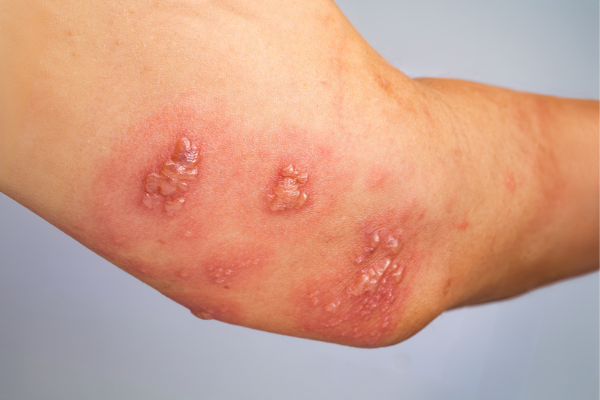Dermatitis Herpetiformis, Gut Health, and Collagen

The connection between dermatitis herpetiformis, gut health, and collagen
Dermatitis herpetiformis (DH) is a chronic skin condition characterized by itchy, blistering rashes and is strongly linked to celiac disease, an autoimmune disorder caused by intolerance to gluten. Although dermatitis herpetiformis primarily affects the skin, there is a complex relationship between this skin condition, gut health, and collagen, all of which interact in different ways. To understand this connection, it is important to explore how gluten affects the body, especially the gut, and how this impact may have consequences for collagen production and the skin.
In this article, we will discuss how Dermatitis herpetiformis is linked to gut health, the role collagen plays in the development and management of this disease, and how the three factors interact to create a holistic picture of the pathophysiology of the disease.
What is Dermatitis Herpetiformis?
Dermatitis herpetiformis is a skin condition that causes blisters and itching, most often on the elbows, knees, back and buttocks. The condition is strongly linked to celiac disease, which means that people with DH often also suffer from celiac disease. Dermatitis herpetiformis occurs when gluten, a protein found in wheat, barley and rye, causes an autoimmune reaction in the body. This leads to inflammation of the skin, where the immune system attacks healthy skin cells.
The Connection Between Dermatitis Herpetiformis and Celiac Disease
Celiac disease is a disease in which the body's immune system mistakenly reacts to gluten and damages the small intestine. The damage makes it harder for the body to absorb nutrients, which can lead to a range of symptoms such as stomach problems, fatigue and weight loss. In some individuals, especially those with DH, the symptoms are not limited to the intestine but extend to the skin, where they cause the characteristic blisters.
Most people with DH have intestinal dysfunction in the form of celiac disease, although not everyone with celiac disease develops DH. When gluten is consumed by a person with celiac disease, it triggers an immune response that leads to inflammation. In the case of DH, the inflammation is not just limited to the intestines but also spreads to the skin.
This link between DH and celiac disease explains why gluten intolerance can have consequences for both gut health and skin health, making managing gluten consumption a fundamental part of treatment for DH.
Gut Health and Gluten Intolerance
The gut plays a central role in the body's nutrient management and immune system function. In celiac disease, the lining of the small intestine is negatively affected by gluten, leading to inflammation and atrophy (destruction) of the intestinal villi - the small projections on the intestinal walls that help absorb nutrients. This damage to the intestines reduces the body's ability to absorb nutrients such as vitamins, minerals and proteins.
Since DH is a form of celiac disease, it means that the functioning of the gut is directly related to the condition of the skin. When the gut is unable to absorb nutrients properly, it can lead to deficiencies in important substances that are crucial for skin health, including collagen. Collagen is a protein that makes up a large part of the skin and other tissues in the body and is essential for keeping the skin firm and elastic.
Collagen and Skin Health
Collagen is the body's most abundant protein and is found in skin, bones, tendons, ligaments and blood vessels. Collagen's main function is to provide structure, strength and elasticity to tissues. Skin collagen is particularly important in keeping skin smooth, youthful and free from wrinkles or other signs of ageing.
In DH and celiac disease, collagen production can be affected by several factors, including gut health and nutritional deficiencies. Because gut health is impaired in celiac disease and gluten intolerance, it can lead to a deficiency of important nutrients, such as vitamin C, zinc, and amino acids, which are necessary for the body to produce collagen effectively.
Additionally, DH and celiac disease affect the immune system, which can contribute to inflammation in the body and on the skin. This inflammatory process can weaken the collagen structure and lead to skin damage that cannot be repaired as quickly or effectively.
How Gut Health and Collagen Relate to Dermatitis Herpetiformis
The connection between gut health, collagen, and dermatitis herpetiformis is complex and multifaceted. Here are some ways that gut health and collagen affect the disease:
1. Nutrient Absorption and Collagen Production
As previously mentioned, gut health plays a central role in the body's ability to absorb nutrients. A person with celiac disease often has an impaired ability to absorb nutrients that are necessary for collagen production. This can lead to deficiencies in important building blocks for collagen, such as vitamin C and amino acids. A lack of these nutrients can weaken collagen production, resulting in thinner skin and poorer healing of skin wounds.
2. Inflammation and Skin Damage
In DH, gluten intolerance causes inflammation in both the gut and the skin. The inflammation in the gut can affect the absorption of nutrients, which further weakens collagen production. In addition, the inflammation can directly damage the skin, leading to blisters and other skin symptoms. The inflammation can make it harder for the skin to recover and regenerate collagen, which can worsen the skin condition over time.
3. Intestinal flora and immune system
The gut microbiota – the millions of microorganisms that live in the gut – also plays a crucial role in immune system function. A balanced gut flora can help regulate the immune system and reduce excessive inflammation, which is crucial for people with DH and celiac disease. Dysbiosis, a condition in which the gut flora is out of balance, has been linked to increased inflammation and can worsen conditions like DH. The microbiome also plays a role in maintaining skin health by helping to regulate the immune response.
4. Gluten and Collagen
Gluten, the protein that causes celiac disease and DH, can directly affect collagen production. Research has shown that gluten can trigger an inflammatory response that disrupts collagen metabolism and contributes to the breakdown of collagen structures in the skin and other tissues. When gut health is impaired, and the body has difficulty absorbing nutrients that are important for collagen production, this problem becomes even worse.
Treatment of Dermatitis Herpetiformis, Gut Health and Collagen Production
Treatment for dermatitis herpetiformis primarily involves eliminating gluten from the diet to reduce inflammation and damage to the gut and skin. A strict gluten-free diet is the only effective treatment to control DH and prevent the disease from worsening.
In addition to avoiding gluten, people with DH can also benefit from the following measures to improve gut health and support collagen production:
-
Nutritious diet : A balanced diet rich in vitamins and minerals that support collagen production, including vitamin C, zinc, and amino acids, is important for promoting skin health.
-
Probiotics and prebiotics : To maintain a healthy gut flora, using probiotics and prebiotics can help restore balance to the gut microbiome and reduce inflammation.
-
Collagen injections or supplements : Collagen can be taken as a supplement in powder or capsule form to help support collagen production and improve skin elasticity.
-
Anti-inflammatory treatments : To reduce inflammation in the skin and gut, medications such as topical corticosteroids or immunomodulatory drugs may be used under medical supervision.
Conclusion
Dermatitis herpetiformis, gut health, and collagen production are all closely linked. Disruptions in gut function, caused by gluten intolerance, can affect collagen production and lead to skin problems such as blisters and inflammation. To manage DH and improve both gut health and collagen production, a strict gluten-free diet is essential, along with nutritional support and treatment to reduce inflammation.
Research on the microbiome and its connection to gut health and the immune system is also providing new insights into how we can optimize the treatment of DH and other autoimmune diseases that affect the skin and gut. By understanding the connections between these factors, we can develop better and more effective treatment strategies for those living with this complex disease.






